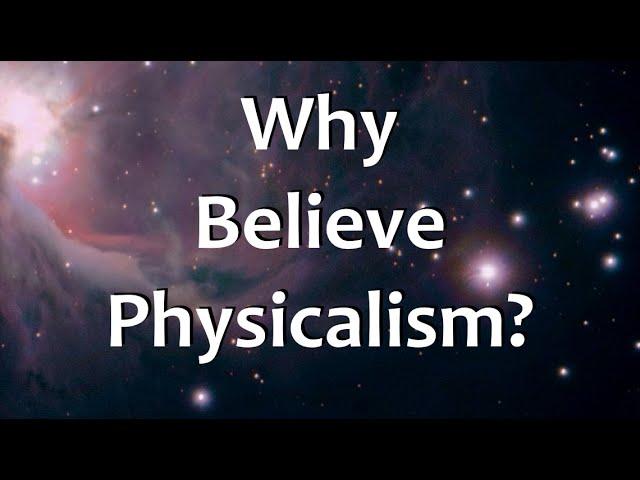Комментарии:

If the question of metaphysics is what things exist, then I think physical things aren't the only things that exist. Does a dog exist? Sure it does, I think we can all agree on that, as long as we aren't idealists anyway. So a dog exists and it is a physical object, does an atom exist? Sure it does, and it is also physical. Do properties exist? So for example let's say gravitons don't exist, and as Einstein proposed (if I'm understanding correctly) gravity is just a property of mass warping spacetime around it, causing apples to fall from trees to the ground on the earth and causing the earth to orbit around the sun. Now then, since there is no physical particle that causes gravitational observations to occur, does that mean that gravity does not exist? I would be inclined to disagree, I'd argue that whether or not there are gravitons, or gravity is just a property of mass, I'd argue that gravity still exists, it is just a property instead of an object like a dog or an atom. It is still something that we can observe, describe and predict. If I can observe and describe something I'd argue it exists, regardless of if it's physical or not.
So then what about math? Does math exist? I'd say that yes it clearly does, we use it every day. And since math can be used to describe physical phenomena that happened long before humans existed and discovered math. I'd argue that math existed in our universe even before we came into existence to describe it. For example I'm sure there are stuff like limits or infinite sums or whatever, or other mathematical concepts that have been used to describe cosmological phenomena, phenomena that used to happen before the earth even existed. Like for example if you can use the formula (4/3) times π times the radius to the third power to describe the volume of a planet that existed even before the earth did. And that planet had that volume physically speaking before humans discovered math to describe said volume, then I'd argue that that formula, the numbers and paramaters used in it existed at least in some sort of conceptual ethereal way even without any humans around to think about it, despite not being physical. Like, a sphere's "radius" isn't a physical thing, there is no "radius fermion" that creates all the sphere's radii in our universe, yet sphere's still have radii, and we know that they do, and it's not just some human invented descriptive parameter, because that paramater can be used in conjunction with other parameters to describe even more physical properties of a planet for example. So it exists independently of humans using it to understand the world around them.
What about thoughts? Do thoughts exist? A physicalist might say that no, thoughts do not exist, because they are not physical, so really it's just electricity running through your brain cells in a particular way, which is all physical. Or they might say that your thoughts ARE the electricity running through your brain. I disagree with both of those notions. Firstly, your thoughts ARE NOT the electricity running through your brain, the electricity running through your brain are merely the physical CAUSES creating your thoughts, but the thoughts themselves are a different entity from the entities that caused them to exist. When I'm thinking about something, like the word "diamond" for example, I'm not experiencing the electricity running through my brain, I don't feel a shock or a jolt, what I feel is the word diamond inside my mind. And if I experience something, I'd argue that it exists in some form, whether it's physical or not. If it didn't exist then how would I experience it? If we are just going to dismiss things that exist when they are not physical then of course physicalists are correct, but why would we dismiss those things? Why say that "Your thoughts don't truly exist, the only thing that exists is electricity, your brain cells, and the electricity passing through the brain cells" and why not instead say "Electricity exists, your brain cells exist, and when electricity runs through your brain cells it causes thoughts to come into existence, but yes, thoughts are also entities that exist, they just aren't physical, and you can't touch them like you can with brain matter or electricity"
Lastly, do fictional things exist? For example does the character Aragorn exist? I'd argue that yes he does, not in a physical way, but he does exist in a conceptual ethereal way. Now you might say "But wait a minute, Aragorn is a human invention of JRR Tolkien, maybe I can grant you that math and properties like speed, volume exists despite not being physical, because at least they describe the physical world. But obviously a fictional character created by a human doesn't exist" and I say well why not? Just because it's a human invention doesn't mean it doesn't exist, I think we can all agree that cars exist right? (actually some ontologists wouldn't agree lol, but just roll with me) and cars are human inventions, cars only exists because humans exist, if there were no humans you wouldn't see any cars flying around in space, okay theoretically speaking it would be possible for a group of atoms to accidentally arrange themselves in the form of a car, but come on, let's be real, we know that wouldn't happen, so cars are physical things that exist only because humans created them, well if humans can create physical things that exist, then why can't we say that mental things humans create also exist? So therefore I say that Aragorn does exist, at least as a concept. And I'm not saying anything like Plato did, like that there is another ethereal dimension where all the concepts live in their ideal form. But I do still think that concepts are real things that exist. They're not in their ideal form, all concepts exist, whether ideal or not. But they're not off in some ethereal plain. They're just... around, here, everywhere and nowhere.
One more interesting question to me is have all concepts existed since the dawn of time? And we're simply discovering them? Or are some created only after we created them first? Like I'd argue that the concept of a sphere's "volume" existed even before humans did, because planets had volumes even before humans existed to observe that, but did the concept of a car exist before humans created or thought of a car for the first time? And if we do create some of the concepts then does that mean they get added to the list of existing concepts?
Anyway, point is, I've just mentioned a lot of things that I would argue exist despite not being physical, therefore physicalism is incorrect in my philosophical opinion, if you're just going to dismiss things like the concept of a sphere's volume because it isn't made out of fermions or bosons and you can't touch a sphere's "volume" or observe it in any physical way. Well then of course you're going to believe that only physical things exist. But I see no reason to dismiss those things as real and existing.

I've just become a neutral monist "Everything's somethin'!"
Ответить
awesome video mate
Ответить
Physicalism destroys the possibly of knowledge.
“The metaphysical view that all is physical”
Beliefs, logic, math, meaning, information, none of which are identical to matter.

Thank you for making this concise introductory lecture on physicalism.
Ответить
I've yet to see the video but physicalism makes no sense to me, since we have no clue what physical is.
It is a concept constructed from a different 'realm' of reality, which would be the mind, awareness, the spirit, consciousness... which in my mind cannot be proved to be more real than the reality from which it is deduced.
Therefore, either physical and 'mental' are two different things, both essential to the universe, or they are the same thing, in which case I would call it 'awareness' instead of 'physical', since it is what I perceive of it.
I'll update if the video changes my mind.

I thought this was presented very well, 贊同
Ответить
Did you just start the video by saying "whats up dog"
Ответить
We don’t have direct evidence that natural phenomena are reducible in themselves to physical causes. We have evidence that when you cut them up and put them in a microscope, grow protein crystals and bombard them with X-rays, collide protons together in particle accelerators, etc etc and observe them with intrusive instruments they display behavior that’s explainable through our best current theories of physics, molecular dynamics, etc. Even in the case of fmris the best systems have a resolution of ~ 3 millimeters and measure relative concentrations of blood flow that can be correlated (at a very rough level) with mental activity (if you tried to measure past a certain resolution I’m sure this would disrupt mental function). Physicalism seems implicitly to rely on the assumption that we can exist as outside observers and measure at least in principle mental states being directly grounded in states of fundamental particles which may not be the case.
Ответить
Not just in Philosophy, Physicalism is the dominant perspective among lay people.
Ответить
I have a methodological question, Kane: How do you know that the current consensus in philosophy is physicalism? Do you have some tool (or set of tools) that let you find that out? If so, could you summarize how you use them briefly? Thanks.
Ответить
anything that's either convincingly argued or demonstrated to be systematic gets absorbed into physicalism. the reason it's successful is thus exactly the same reason science is successful. because it's just the name for everything that works, making it a tautology.
you falsely brand science as some grand endeavor to discover how the world works. but that's complete nonsense. science is an industry of publishing philosophy. it's a religion with a dogma and a ceremonial cult just like any other. and the reason it grows more and more successful is because it violently absorbs into itself any claims, notions, ideas, whatever that are most popular at the time.
you can easily see this in the way it took on certain aspects of traditional cultures around the world in the wake of colonialism. you can see it in the way that philosophy at large has been reduced to talking about bullshit that hasn't gone anywhere in thousands of years because as a consequence of being wrong it just fundamentally can't. you can see it in how Alan Turing's philosophical musings over automation became Computer Science. etc.
you can also see it in the Piltdown Man hoax, with Piltdown being widely accepted for several generations simply because it fit expectations. and notably the chemical dating technique used to confirm Piltdown was a hoax was invented decades before Piltdown was first presented, and several of the first scientists to ever see Piltdown immediately spotted it as a hoax. but that was inconvenient to the desired narrative, so Piltdown was gathered up and held jealously, deliberately kept from being examined, and real human ancestors like Australopithecus were derided as just being chimpanzee skulls, because science did not want Africa to be the homeland of humanity.
there's also the case of the snow leopard, which was well documented before it was hypothesized that the material the hyoid is composed of dictates whether a cat roars or purrs. the significance of this being that snow leopards violate the trend, illustrating that the hypothesis is nonsense. regardless, the hypothesis was maintained for about 80 years, at which point it was upgraded to scientific theory by the world's top expert in... wait for it... motherfucking snow leopards. and him being who he was, this theory was maintained for another 80 years before someone finally published a scientific paper in the early 2000s calling bullshit on this whole thing.
these, and many more, clearly demonstrate that science and physicalism are not successful because they're the best way to do things. instead they show that science is built upon conspiracies, lies, misunderstandings, expectations and saving face. they are maintained via violent selfishness and solipsistic disregard for anyone who does not constantly pledge their allegiance to the cult.
in short, most of what you said is simply nonsense.

I'm beginning to think there's no problem with physicalism, but there are many problems with philosophy.
Ответить
Ther is no evidence or any facts to show that physicalsim is wrong. All the data and all the scientific facts we have show us that physicalsim is correct. Not the inverse. Matter exists. Matter exists everywhere we can measure. We see no evidence that it doesn't.
Ответить
physicalism is reductive to absurdity. language, thought, abstract cocepts such as "freedom", etc, all are so ingrained in our lives we take them for granted.
Not that we should take them for granted, but to demonstrate how pervasive non-physical things exist within our world.
I feel it persists due to the natural sciences, which, although have shown great success, is not much more than a collection of collective experience (information) passed down (via language), that describe the mechanics of (only) the physical aspects of our world.
It's also funny that mathematics, the least natural and physical field, is considered the most "pure".

There is the linguistic problem, which is to say that we ask "why" which implies intent and explanation in terms of intent rather than "how" which implies the mechanical methods, which, in turn implies rules of action, but not causation (intent or first movement) of action.
In short, physicalism relies on determinism which in turn relies on a "first mover" problem.
Secondarily, the assumption is made that physical causes mental states to exist, and such what we perceive as non-physical is an illusion and all is reduction to physical.
By why not the physical existing as a representation of the nonphysical?
It fits better with science to believe that non-physical things like forces and wave functions cause physical things to pop in and out of existence as representations of these non-physical things.
Secondarily, with philosophy of the mind, AI makes more sense in that it demonstrates that intelligence is not an inherent property of the matter it is built of, but that the actions and the subsequent effects/results are the the result of rules (code) that is written or translated (linguistics, which are physical representations via symbols) into a series of actions..
Which in and of itself, I feel should be considered artificial intelligence only because it was given first cause by humans and its origins were within a lab. Otherwise, it's not unreasonable to say AI is the same methodology by which intelligence arises within life, just forcibly and on a far far shorter time scale (which really may be why we suck at making truly human AI. We're trying to do in 5 years what took several thousands of not millions).

i got two seconds in and had to pause the video ilu you cringe idiot. thank you for making very good educational content
Ответить
AGREEMENT IS NON-PHYSICAL;THOUGH I AGREE THAT IT REQUIRES GOD TO DEFINE WHAT AN AGREEMENT THEOLOGICALLY IS; DON'T WE ALL PHILOSOPHICALLY AND MATHEMATICALLY AGREE? IS THIS A PHILOSOPHER'S PUZZLE KAITO DIAMOND AND ROOK BANJO CROSSFIELD?
Ответить
REASON AND INSTRUCTION IS ABSOLUTELY SPIRITUAL. (TRANSCENDENTAL)
Ответить
Noted philosopher Bill Clinton gave the proper answer to all such views: It depends on what the meaning of “is” is.
Ответить
I'm a solipsistic physicalist =P
I can't rule out solipsism, but in my solipism everything seems to behave in a physicalist way and seeing as I seemingly cannot bend reality to my mind, the only coherent way to order my mind and my experience is as though physicalism is true.

The knowledge argument works against physicalism imo
Ответить
Would you call yourself a physicalist, Kane?
Ответить
It is a pitty that for an in itself interesting philosophical debate about what constitutes the real world, you choose to argue against the position of physicalism instead of that of materialism, as the position of phsycialism has obviously some serious flaws. The position of physicalism that "all there is" is physical in nature of course rejects the notion of mental states as "existing things" which are not physical in nature. What can be acknowledged is that mental states and changes in mental states require changes in physical states. The materialist perception of reality is that the primary substance that constitues reality is matter and consciousness is secondary, both in the ontological sense (we can not have mental states outside of there being a material reality) and in the temporal sense (there first needs to be a physical universe in which under the right conditions living organisms could form, replicate and evolve) before conscious sentenient beings like us could evolve. Note also that in modern quantum theories the physical entitites that are primary constituents of physical reality are not particles (bosons and fermions) but quantum fields, as the particles themselves are excitated states of such quantum fields. For the materialist position, the question of what fundamental physical entities exist, has no direct answer, as that is left to the physical sciences, and moreover we do not directly experience matter as such; we only encounter specific arrangements of matter, like the chemical elements or the subatomic particles and radiation. Matter just comprises the substance that exists independent and outside of consciousness, is in state of flux/change always, and exists in space and time as its mode of existence.
Ответить
Parsimony mainly.
Ответить
Does physicalism necessarily entail a reductive project? It seems to me that there are people who hold to the idea that reality is comprised of interactions of fundamental forces and components, but allow for emergent phenomena that cannot be predicted or explained by virtue of a reductive examination of the constituent parts.
Ответить
When you say that physicalism has reached consensus, does that imply that for example mathematical platonism and theory of abstract objects are almost entirely abandoned?
Ответить
How is it possible to have a consensus that physicalism is true if we cant even agree how to define it.
Ответить
I love it every time Kane begins a video with his contagiously whimsical "What's up, dogs"
Ответить
Physicalism is an...idea! Therefore, physicalism does not exist for a physicalist...
Ответить
Physicalism leaves some questions unanswered. First, why is there anything at all? Physical objects have possible, non-actual properties. But how do you show that the merely possible existence of some physical object is physical? Can you see, hear, touch, taste a possibility?
Second, if physical objects have always existed, is the existence of some objects a brute fact? A brute fact is something that can't get explained, even in principle. So if there's at least one brute fact, there's no way to discover that it is one. That's because the ability to do that presupposes an explanation, which by definition, a brute fact can't have. To know that you've found a brute fact, you must know what evidence shows that it is one.

There is no consensus in philisophy for physicalism.
Ответить
Physicalism is the only conceivable philosophical stance for doing science, especially physics.
Physicalism has led to all these amazing progress in sciences the last centuries.
Idealism is stagnation, a vicious circle, while solipsism ( its most extreme version) is a conceptual dead end, both in philosophy and also in physics and applied sciences.

Is belief physical?
Ответить
"Physicalism is the consensus among philosophers"..... Eh really? consensus? Some philosophers are theists, some are idealists. I dont think you can say there's a consensus. Maybe the majority but consensus, no.
Ответить
thanks, Kane!
Ответить
Another idiotic ideology. No, everything that exists is not physical. Consciousness (the hard problem for philosophy) is not. That is why it is the hard problem. Mind and the gross elements are physical or elemental; the mind a subtler elemental than the physical gross; macro and micro elemental. There is an attempt by materialists to reduce consciousness and mind to the gross physical which is seen as fundamental or causal to their existence and functioning.
Vibration or rates of vibration are not understood. Consciousness not being elemental is not subject to vibration or motion. What is elemental is subject to motion at different rates of vibration from subtle to dense. The four beasts of the apocalypse: motion; time; space; and the atom are post not pre consciousness.
It has been said that in the higher ages those who were incapable of understanding anything other than matter were employed in sweeping the streets. There are many in philosophy today who are materialists; they should be employed in sweeping the streets. Leave philosophy to the non-materialists, as the materialists will reduce it to gibberish. Not something Plato could have foreseen.

Phenomenal consciousness: "am I a joke to you?"
Ответить
Metaphysical theories that are not completely worthless explain the correspondence between our conjectured references to abstractions and the real world. Abstractions include the laws of physics, causality, time, our refuted theories, our morality, political projects, etc. The real world, which exists, is inaccessible to us except through our tiny window of physics to the infinity. It seems that some phenomena require emergent fundamental laws to make progress in explaining consciousness, qualia, thermodynamics, etc. So few have noticed that knowledge creation via induction is necessarily impossible. Popper’s concept of problem, to this date, is the best starting point to explain why we guess and criticize solutions, i.e. objective knowledge (false, but approximately enough to solve the problem at hand). Forget reductionism.
Ответить




![[EP.4] (ENG SUB) ※오디오 주의※ 역대급 슼망진창 추억의 게임 [ FANDOM TOUR | 덕후투어 ] [EP.4] (ENG SUB) ※오디오 주의※ 역대급 슼망진창 추억의 게임 [ FANDOM TOUR | 덕후투어 ]](https://rtube.cc/img/upload/QVZpSGtHMklLcEE.jpg)





















